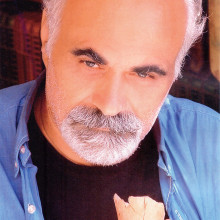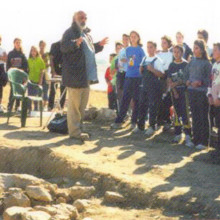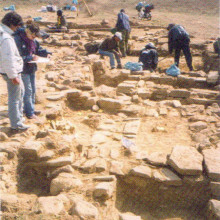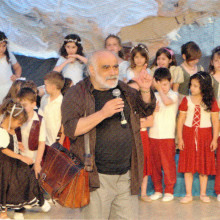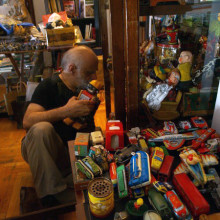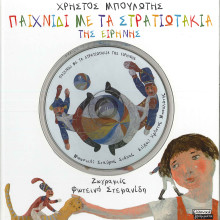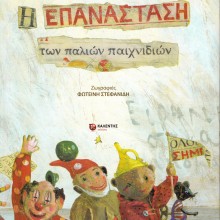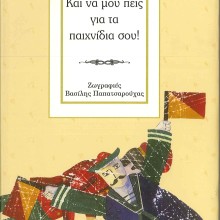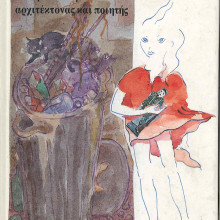The collector
 Christos Boulotis was born in 1952 in Myrina, Lemnos. In October 1959, his family relocated to Athens. He studied History, Archaeology and Comparative Linguistics at the University of Athens and under a scholarship at the University of Würzburg, where he authored his doctoral thesis in 1980.
Christos Boulotis was born in 1952 in Myrina, Lemnos. In October 1959, his family relocated to Athens. He studied History, Archaeology and Comparative Linguistics at the University of Athens and under a scholarship at the University of Würzburg, where he authored his doctoral thesis in 1980.
He has specialised in the Minoan and Mycenaean civilisations, with an emphasis on their religion and writing. He has taught at the Ionian University (Corfu) and for a number of years at the post-graduate departments of the School of Philosophy of Athens and at the Athens School of Fine Arts, as well as creative writing at the National Book Centre of Greece. Since 1985, he has served as an archaeologist-researcher at the Academy of Athens. He has participated in numerous excavations, including Minoan sites on Crete (Archanes, Zakros), the settlement at Akrotiri on Santorini and at ancient Elis. Since 1992, he has been excavating on his home island, directing the systematic excavations taking place at a highly important, long-lived prehistoric settlement on the islet Koukonissi (in Moudros Bay).
He has published numerous studies (in Greek and other languages) on subjects coming under his specialisation and of general cultural interest, and frequently lectures in Greece and abroad. He has served as a member of UNESCO for archaeological heritage management issues, he is a member of the Archaeological Society at Athens, the German Archaeological Institute, the Museum of Acropolis, the Hellenic Authors’ Society and, since 2010, has been a member of the small scientific committee of the Hellenic Parliament Foundation for Parliamentarism and Democracy.
Apart from his other activities, he has authored poetry collections, short stories, dramatic works and academic essays for the daily and periodic Press. He has been largely involved in children’s literature since 1987. To date, he has published around seventy books at various publishing houses, certain of which has been translated into English and German. His first book, titled The Strange Love of the Horse and the Poplar won the great European Pier Paolo Vergerio prize in 1989. In 2000, his book titled The Statue Who Was Always Cold won the state children’s literature prize, which he was awarded another two times (in 2011 and 2012). Other important prizes he has won include the ‘Kostas and Eleni Ourani’ prize of the Academy of Athens (2006), which he was awarded for his overall contribution to children’s literature. In 2012, he represented our country as a nominee for the international Hans Christian Andersen Award.
As an obsessive collector of old toys and children’s books, he first envisioned in 1978 the creation of such a museum in Myrina, his birthplace, donating for this purpose his collection to the Municipality of Lemnos – a collection numbering many thousands of toys and rare publications. His vision, which had been his goal for over three decades, is now a reality!
He implemented the convergence and complementarity of toys and books not only through his two-fold activity as a collector, but also through his writing. Thus, many of his books feature toys as a key fictional material, some of which play a leading part:
- The toy soldier who wanted to be an architect and poet
- Tell me about your toys
- Toy soldiers in the well (short story)
- Playing with the toy soldiers of peace
- The revolution of old toys
His works classified as children’s literature have been repeatedly included in the Anthologies published for Primary School children and he frequently visits schools around Greece to speak to children not only about his own books, but about the importance of literature in general, so as to stimulate their love for reading. In 1997, he was assigned by the Ministry of Education with authoring the first chapters of the book titled The cultural contribution of Hellenism from Antiquity to the Renaissance for 10th grade pupils.
With his love for children and a responsible attitude towards them in mind, he takes pupils of schools in Moudros and the nearby area on tours of the excavations he conducts at the prehistoric settlement on Koukonissi, as he fervently believes that knowledge of local history and the past in general is a key element of cultural identity and social cohesion and continuity, particularly in remote areas such as Lemnos.
